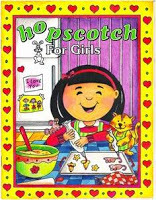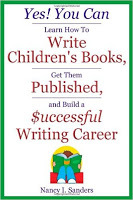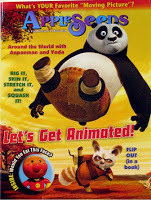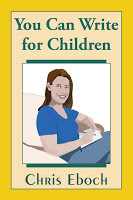Why You Should Write Magazine Nonfiction
 The following is excerpted and adapted from
You Can Write for Children
: A Guide to Writing Great Stories, Articles, and Books for Kids and Teenagers.
The following is excerpted and adapted from
You Can Write for Children
: A Guide to Writing Great Stories, Articles, and Books for Kids and Teenagers.Beginning writers often focus on trying to publish picture books or novels. However, many career writers – those who make their living from writing – do at least some nonfiction work for magazines. For example, in the tax year before this writing, I sold over a dozen articles, earning over $3000. That's more than I made from novel advances and royalties combined.
 Nancy I. Sanders, author of Yes! You Can Learn How to Write Children’s Books, Get Them Published, and Build a Successful Writing Career, describes the advantages of magazine writing. “There’s an unending opportunity to get published and build your writing credentials, especially in the smaller magazines. There are countless topics to write about for each different magazine’s focus, so it’s easy to find one that matches your personal passion. And finally, there are a significant number of magazines that pay and pay well.”
Nancy I. Sanders, author of Yes! You Can Learn How to Write Children’s Books, Get Them Published, and Build a Successful Writing Career, describes the advantages of magazine writing. “There’s an unending opportunity to get published and build your writing credentials, especially in the smaller magazines. There are countless topics to write about for each different magazine’s focus, so it’s easy to find one that matches your personal passion. And finally, there are a significant number of magazines that pay and pay well.”Author, instructor, and free-lance editor Bobi Martin’s says, “If I come across a topic that intrigues me, I study Magazine Markets for Children’s Writers to find magazines that my idea might be a good fit with. Next, I check to see if the age range and word limits of the magazines I’ve targeted fit with what I had in mind for the article. When I don’t have a topic in mind, I study the listings to see what magazine editors are looking for. When I have two or three magazines in mind, I visit their websites for their most current information. This is a great way to generate new topics to write about!”
Follow the Guidelines
Checking writer’s guidelines is important, because magazines often have strict rules for article lengths and the topics they cover. Some even use theme lists, with each issue covering a specific topic, such as a particular aspect of history or science.
 Marcia E. Lusted is an Assistant Editor and Staff Writer for e-Pals Publishing, working with the Cobblestone group of children’s nonfiction magazines. “My advice would be to really pay attention to what magazines’ needs are, particularly if they are themed,” she says. “We get so many good queries that just don’t fit any of our upcoming themes and we can tell that the writer hasn’t bothered to notice that we are themed! The marketing aspect of writing – figuring out what a magazine needs and matching ideas – take time and effort.”
Marcia E. Lusted is an Assistant Editor and Staff Writer for e-Pals Publishing, working with the Cobblestone group of children’s nonfiction magazines. “My advice would be to really pay attention to what magazines’ needs are, particularly if they are themed,” she says. “We get so many good queries that just don’t fit any of our upcoming themes and we can tell that the writer hasn’t bothered to notice that we are themed! The marketing aspect of writing – figuring out what a magazine needs and matching ideas – take time and effort.”One advantage to writing magazine nonfiction is that you can sometimes pitch an idea instead of submitting a completed article. Even if a magazine only accepts finished articles, you can suggest other ideas in your query letter.
“When you submit a manuscript or query a magazine with your idea, it also helps to add a list of three to five ideas that might fit well into their particular magazine if your main topic doesn’t fit their current needs,” Nancy Sanders says. “I’ve landed more magazine writing assignments over the years by including a short list of other ideas in my query or cover letter for the editor to consider. Giving them the chance to choose another topic if they find merit in your writing helps avoid the constant stream of ambiguous rejections from editors saying, ‘Doesn’t suit our current needs.’”
 Stop by next Wednesday for advice on researching the magazine market – or subscribe to get posts automatically and never miss a post. You can use the Subscribe buttons to the right, or add http://chriseboch.blogspot.com/ to Feedly or another reader.
Stop by next Wednesday for advice on researching the magazine market – or subscribe to get posts automatically and never miss a post. You can use the Subscribe buttons to the right, or add http://chriseboch.blogspot.com/ to Feedly or another reader.You can get the extended version of this essay, and a lot more, in You Can Write for Children : A Guide to Writing Great Stories, Articles, and Books for Kids and Teenagers. Order for Kindle, in paperback, or in Large Print paperback.
Sign up for Chris’s Workshop Newsletter for classes and critique offers
Published on January 06, 2016 05:00
No comments have been added yet.



